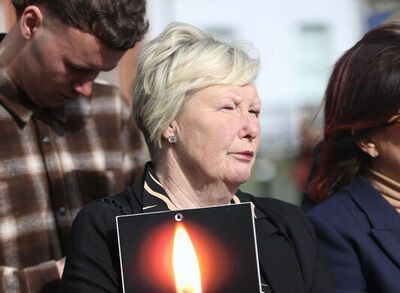[caption id="attachment_80072" align="alignnone" width="300"] 2015_Sarah_McQuaid_4
By Colleen Taylor
Sarah McQuaid is not just a transnational musician, she’s a trans-genre one. The American singer-songwriter, who has lived in France, Ireland, and now resides in England, resists a singular musical identity. Having started her career with a traditional Irish album, McQuaid’s most recent and fourth album, “Walking Into White,” departs from her more folksy background and ventures into contemporary, indie music territory. Here in the U.S. for the promotion of “Walking Into White,” McQuaid recently chatted with me about her vast range of musical interests.
McQuaid credits Ireland with her music career: “If I hadn’t moved to Ireland,” she said, “I doubt if I’d have taken the musical direction I’ve taken.” Her time in Ireland quickly opened her up to a network of abundant musical creativity. “I think it helped that it’s such a small country,” McQuaid explained, “Once you start meeting people, it’s quite easy. Within a short time of moving there, I’d gotten to be friends with all these people, Gerry O’Beirne [her collaborator and producer], Donal Lunny, Niamh Parsons, Máire Breathnach—these are people I would have worshipped from afar from the States. And then I moved to Ireland and they became friends and collaborators.” McQuaid is indebted to Ireland for another network as well, a familial one. She met her husband in Ireland, and now they live in Cornwall with their two children.
The singer’s four albums comprise a comprehensive survey of the globe’s folk culture. Her first album, “When Two Lovers Meet,” is an exquisite rendition of a number of old Irish songs. McQuaid’s voice naturally yields to the soft, tragic tremors of traditional Irish vocalization. Much like the singer and Ireland itself, her voice and the Irish folk song were a fortuitous, well-made match. Sarah followed “When Two Lovers Meet” with an Appalachian music album in honor of her mother. Her third album marks the origin of her songwriting career. McQuaid met pop singer Zoë Pollock (known just as “Zoë”), who taught her about writing songs and, as McQuaid explained, she learned “to free up the structure of my songs.” For her third album, “The Plum Tree and the Rose,” her songwriting brought her back four centuries in history to the Elizabethan era for her subject matter as well as her musical style.
“Walking Into White” (2015) is her American album, produced and recorded here in the U.S., where it is now receiving some of its best responses yet. McQuaid has been performing the album in its cohesive entirety for her American audiences, and her listeners have been excited by the prospect. “When you’re making an album, you put a lot of effort into the sequence, and having the whole album tell a story in some sense. But then, most people who buy an album put it on shuffle. I liked the way the album flowed, so I perform the whole thing the first half of the show,” she explained. The title of the album is a metaphor with self-reflexive meaning. It is taken from a book she had been reading to her children, from a point in the story when the two main characters get lost in a fog. “I thought it was a very strong image of these two children groping their way blindly through, and I thought it was a really good metaphor for life, certainly for my life.” Furthermore, the metaphor extends to her new ambitions for the genre of her latest album as well. McQuaid elaborated on her metaphor with eloquence: “The title itself expressed how I’m taking a new direction and going beyond the folk genre…just being a lot more free with my style and my structure, and that felt kind of like a journey into the unknown.”
Overall, “Walking Into White” may represent unknown territory for McQuaid, but one element of her latest album is not so alien, and that his her duet partner, her guitar. As she emphasized, “With me, the guitar is of equal importance, if not more, than the singing.” McQuaid’s musical product is true to her word. Her songs on “Walking Into White” honor the sophistication and elegance of the guitar strings and create an intricate dance of call and response between human voice and guitar chord. The end result is a unique acoustic stylization that is the stand-out factor of all of McQuaid’s music. Give her a listen not just to experience her interesting, sometimes eerie vocals, but to see how she interacts with her almost anthropomorphized instrument. What’s more, her guitar playing retains her career’s original Irish identity. McQuaid plays exclusively in dadgad, a type of toning for the Celtic guitar that she learned in France when playing with an Irish band. It’s something that makes McQuaid and her contemporary album different, something that’s not your run-of-the-mill singer-songwriter routine. Sarah McQuaid demonstrates fearless creative exploration when it comes to genre and to instrumentation.
McQuaid and her guitar are making their way to the East Coast. She’ll be performing in Bristol, Conn., on Sept. 24 and Voorheesville, near Albany, on Sept. 25. Find out more at sarahmcquaid.com.
Colleen Taylor writes the Music Notes column each week in the Irish Echo.










